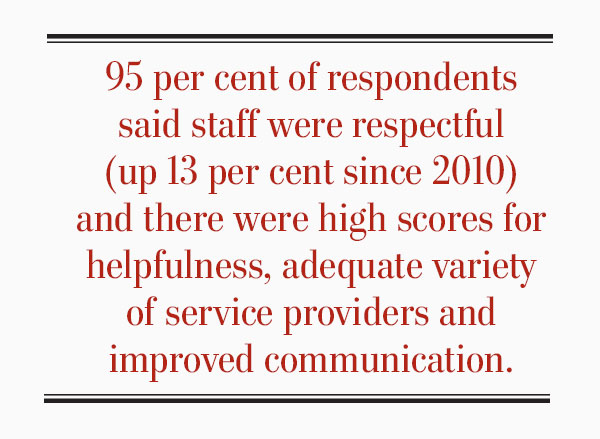
Veterans seem to be happier with most aspects of service from Veterans Affairs Canada (VAC), but the department’s 2017 national client survey shows continuing dissatisfaction with some services and benefits.
VAC surveyed 1,508 veterans in proportionally representative samples of each group of its 177,149 clients, including those with and without case managers, war service and Canadian Armed Forces (CAF) veterans, survivors and RCMP.
“Although the average results…can be considered moderate to good, there is still room for improvement to achieve a level of excellence,” said the report by SOM Research and Surveys of Montreal.
Since 2010, VAC has gained ground in 14 areas, and case-manager relations are at the top of the list, with a 28 per cent increase in respondents reporting working well with case managers, and a 27 per cent increase in numbers reporting case managers kept them informed on how to access services. (However, between 10 and 18 per cent of respondents reported dissatisfaction with some aspect of case-manager relations and support).
Moderate improvements were noted in matching treatment benefits to needs, inclusion of family in case-management plans and fair treatment (12 per cent); ease of reaching an agent (10 per cent); time to reimbursement (nine per cent); and finding out everything required to apply for a service or benefit (seven per cent).

Nonetheless, 21 per cent of respondents found the application process difficult and 17 per cent did not find out everything they needed to apply for a service or benefit.
A third of veterans (particularly CAF) feel they were not adequately compensated and nearly a quarter do not feel recognized for their disability. A fifth of veterans felt rehabilitation and vocational assistance programs have not helped improve things at home, 24 per cent said the same about community involvement and 29 per cent about work.
On the positive side, 95 per cent of respondents said staff were respectful (up 13 per cent since 2010) and there were high scores for helpfulness, adequate variety of service providers and improved communication.
The Veterans Independence and Treatment Benefits programs scored highly, as did experience with VAC over the past year. Overall, 78 per cent of veterans were satisfied with programs and services—which means 22 per cent were less than satisfied.
The report found differences among the client groups. Veterans collecting pensions were more satisfied than those receiving disability awards and veterans with case managers were more satisfied than those without.
“While the department is meeting the needs of the majority of veterans, there is still room for improvement,” commented Minister of Veterans Affairs Seamus O’Regan.
The survey has been resurrected after it was cancelled in 2015 and will be conducted biannually. “The feedback we received from the survey will help us adapt our services and benefits to continue to better serve veterans and their families,” said O’Regan.
Advertisement



















